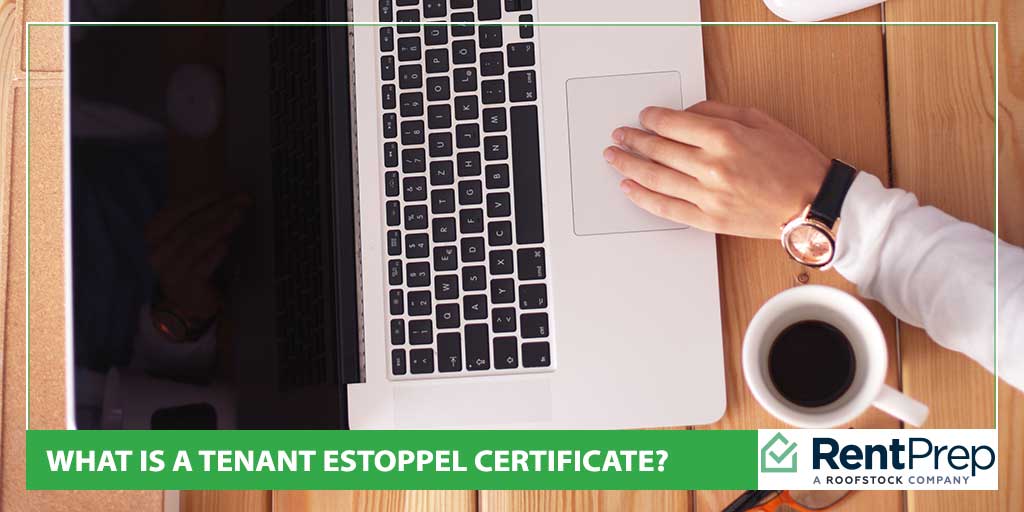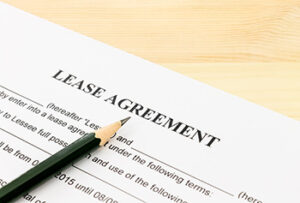
Have you heard of a tenant estoppel certificate (TEC)? If the answer is no, then you need to get informed, and quickly.
A tenant estoppel in real estate can be a lifesaver and save you a lot of hassle in disputes or property sales and investment. We want to make sure that you’re in a strong position, so this article is your authoritative guide to TECs. If you’re asking yourself what is a tenant estoppel, then keep reading for more information.
Table Of Contents For TECs
- What Is An Estoppel Certificate?
- What Provisions Should An Estoppel Certificate Make?
- Why Should You Have A Tenant Estoppel In Real Estate?
- What Can I Do If A Tenant Refuses To Sign?
What Is An Estoppel Certificate?

A tenant estoppel certificate, or TEC, should be an integral part of your rental agreement in commercial rentals. It can be very difficult to sell property with tenants and the estoppel certificate makes that process much easier.
According to Black’s Law Dictionary, a tenant estoppel certificate is “a written, signed stipulation of previously established facts preventing subsequent contradiction or recant of these facts.”
The estoppel certificate is a certified legal statement made by the tenant during the leading process that verifies the terms and conditions of the current lease status. They also verify that there are no past due or prepaid accounts and include a statement verifying that the landlord is also meeting all of their obligations.
What’s In A Tenant Estoppel Certificate?
There are several things that go into an estoppel in real estate, and you will want to make provisions allowing you some breathing room for TECs when you write your lease agreement. Here are some of the standard things that TECs all must include to be of use to you:
- Dates: the commencement date of the lease and any renewal and end dates
- Rent: how much is due, when it gets paid, and what’s due over the term of the lease
- Renewals and extensions: automatic renewals when applicable, terms of extending leases when they’re nearing the end of term, whether the tenant has purchasing rights, etc.
- Whether or not there are any agreements upon automatic lease extension under current terms or with negotiation
- That the lease is in effect in full force and unmodified by oral or in writing changes
- Whether the tenant has the option to lease or use any other space in the building
- Security deposits and any interest rates
- That the landlord has completed all improvements required and performed all maintenance obligations
- That the tenant is not in bankruptcy or party to litigation regarding the property
- Other relevant terms of the lease
- Contact information: both parties’ addresses, phone numbers, and email addresses
What Additional Provisions Should I Make For TECs?
When you draft a lease agreement, you should have a section that makes provisions for your TEC rights. At a minimum, your lease should require a tenant to provide a TEC upon request.
You will need to make a provision for how many times you can request a TEC and how much time they have to respond to it when you make the request. A standard time frame is usually 15 days. Make sure that you mark this in business days to account for holidays and weekends and avoid potential legal ramifications of being unclear.
These time frames often come with a deeming provision. What this means is that you can make a provision in your lease agreement that the tenant is deemed to have accepted the submitted TEC as true and valid if they do not provide either objections or signatures in the allotted time frame. This is essentially a tacit consent clause. You can revise this by saying that failure to respond appoints the landlord as the tenant’s attorney in fact for the execution of the estoppel statement.
Occasionally, if relationships are not well established or on good terms, TEC provisions in leases will also provide that tenants are liable for all damages incurred by the landlord as a result of failing to return the signed estoppel certificate in a timely manner and also lay forth a monetary penalty for failure to do so.
Why Do You Need A Tenant Estoppel Certificate In Real Estate?
This document seems superfluous when you already have a signed lease, but there are a lot of reasons to have one, the primary reason being that they provide proof of cash flow.
Verify The Lease Agreement

More than likely the first thing a potential buyer will ask for if you want to sell your property is a TEC. This tenant estoppel certificate is a way to verify the terms of your lease agreement. It lets potential buyers know that you are not misleading them about the rental income they will receive from the property because the tenants have verified the truth of your claims.
This is also the first thing a lender will ask to see if you want to take out a mortgage or loan on additional property. When they consider your income and ability to repay the loan, the amount of income you are receiving from your rental properties makes a huge impact on their likelihood to lend to you.
Protect Yourself
Tenant estoppel certificates also provide you with an opportunity to protect yourself in a dispute with a tenant before the potential buyers see any conflict. If a tenant has any unresolved issues or disputes with you, then they can be addressed before the signature on a TEC is provided instead of having them brought to the attention of lenders and buyers. It also gives you an opportunity to work out any side agreements and verify them in writing.
Peace Of Mind
Another reason to have a tenant estoppel certificate is for peace of mind. This prevents the lessee from making inconsistent claims with the terms of the estoppel at a later date in time. This prevents you from being held liable for damages or discrepancies that arise after a sale has been made. It shows that both you and the tenant are on the same page about the lease terms and that numbers have been fairly represented in sale.
These also offer your buyers peace of mind when it comes to purchases. A sale that includes a TEC is often worth quite a bit of extra money because the buyer doesn’t have to worry about whether there will be any lawsuits from the tenants. They will not be able to dispute the terms with the new owner because they certified that the terms used in the sale were all correct.
What Can I Do If A Tenant Refuses To Sign The Tec?
There are several reasons a tenant may have for refusing to sign a tenant estoppel certificate. Each of them means something different in terms of how to resolve it, and if you can avoid legal battles, then all the better.
Lack Of Understanding
Sometimes, a tenant doesn’t understand what an estoppel certificate is and why they are being asked to sign one. In these cases, you can explain it to them and walk them through the process. Pull out the lease and show them each spot that you’re asking for information and how it compares to the lease so they know you aren’t trying to change any terms on them.
Explain that you want to ensure that they are being protected in the potential sale of the building just as much as your own interests and that this certification lets them have the assurance that the new landlord knows the terms of their lease and is legally obligated to uphold them.
Landlord’s Form
In commercial real estate, a lot of businesses have prepared forms that they like to use at the recommendation of their lawyers. Occasionally, a tenant may object to signing the estoppel because they want to use their own prepared estoppel certification. In this case, you just need to compare theirs with yours to see if there are any significant differences and make sure the prospective buyer is willing to accept the tenant’s form instead of your own. Usually, they will have no issue with this.
Disputes
Sometimes, tenants have reasonable grounds for disputing the estoppel certificate. This should not arise frequently if you have been upholding your end of the lease terms, but if it does, then it will be in your best interest to negotiate a quick resolution before moving forward. You never want to submit an estoppel that alleges defaults or failures on your end because it will detract from your negotiation abilities and potentially cost you the entire sale.
You also want to be careful in bringing breach of lease claims forward while trying to sell the property if you are in an active dispute. The court precedent set in the 1997 case Johnstown Mobile Ctrs. V. Williams was in favor of the tenant not breaching the lease by refusing to sign the estoppel because the certificate’s provision included a clause that states the lease is valid and subsisting in full force and effect. The landlord was held liable for nearly $30,000 as a result of their own breach of lease.
Litigation
If all of the negotiation fails, then there are some legal remedies. Hopefully, you’ve made the recommended lease provisions that can help protect you. If you just have a simple provision that the tenant must complete a TEC when requested, then here are a few options for you to pursue.
As drastic as it sounds, you can potentially terminate your lease with the tenant. Failure to provide a TEC when it is a term of the lease is a breach of contract, and your lease allows for termination upon breach of the lease agreement. Unfortunately, this is a very impractical solution. Buyers want to be assured of the income in a space, and having to negotiate without the guaranteed income puts you at a disadvantage.
Also, as quickly as contracts for real estate move, it may be difficult to sell the property while in the midst of a legal dispute getting a tenant to leave. Different states also have different provisions as to the allowed procedures, so make sure you check your state specific landlord tenant laws before taking action.
Seller’s Affidavit
Another thing that you could do in the absence of a TEC is to provide a seller’s affidavit. This is essentially your own legal certification that swears to the facts that would have been provided in the TEC. It is nearly identical to the tenant estoppel certification, but it’s signed by you instead of the tenant so it’s less likely to appease a potential buyer or lender.
It also tends to be much riskier for landlords than estoppel certificates. Whereas an estoppel certificate puts the tenant’s word in writing, the seller’s affidavit can hold you liable for any discrepancies. Essentially, the estoppel binds the tenant to the conditions they signed on the certificate, regardless of any existing discrepancies. For a buyer, it is a legal document that binds the tenant to the terms set forth in the estoppel regardless of what the original lease agreement was.
A seller’s affidavit holds the seller responsible for discrepancies if a tenant brings a dispute to the new buyer regarding the understood terms of the lease. If the buyer is put at a disadvantage based on inaccurate assessments of rental income, or disputes where a landlord is in breach of maintenance agreements or other lease aspects, they are able to pursue you for any damages that occur as a result rather than the purchaser or tenant being responsible.
If you sign a seller’s affidavit, then make absolutely certain that every piece of information included is correct and verifiable, and be sure to have proof and documentation saved in case you ever need to back that up in legal disputes.
Conclusion
As you can see, a tenant estoppel certificate is extremely important when dealing with rental properties, especially in the case of commercial real estate. It protects you from being liable for any discrepancies in lease terms after a sale has been made and improves your ability to negotiate more favorable sales terms by reassuring potential buyers of cash flow.

